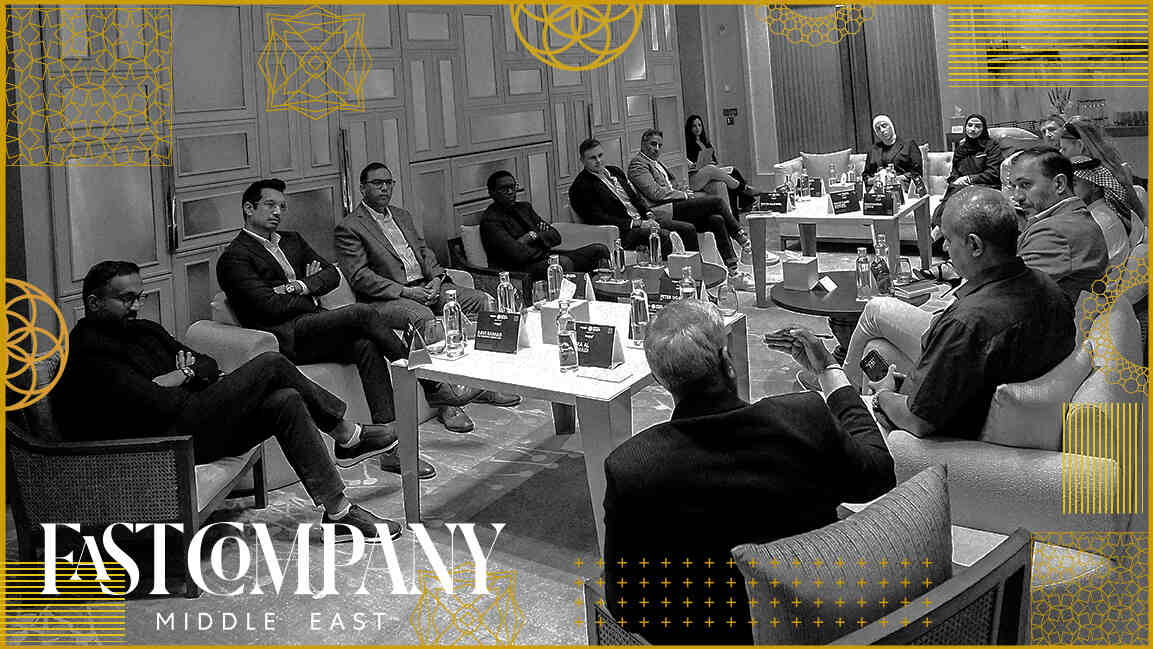- | 10:00 am
Humans, machines, and lifelong learning: Impact Council members on the future of jobs and skills
Leaders emphasize that striking a balance between technological adoption and continuous upskilling is crucial for future-ready organizations

Artificial intelligence is rewriting the nature of work today. Across industries, leaders are confronting the same question: how can we balance machines doing the ordinary with humans focusing on the extraordinary?
At Fast Company Middle East’s Future of Jobs and Skills Impact Council subcommittee session, powered by Solutions+, a leading UAE business consultancy offering digital solutions and shared services, business leaders gathered to debate how AI is transforming the workforce, and what skills individuals and organizations must develop to thrive in this new era. The meeting was held at the Mandarin Oriental, moderated by Ravi Raman, Publisher of Fast Company Middle East.
AI AS A PARTNER AND NOT A THREAT
One of the themes that emerged was how organizations should frame AI. Rather than being seen as a rival to human workers, AI is increasingly viewed as a collaborator, one that can free humans to focus on creativity, innovation, and higher-value tasks.
“How do we use computers for the ordinary and humans for the extraordinary?” Gavin Maxwell, GBS Transformation Leader at EY MENA, asked. “It’s about looking at what skill sets people bring that are really additive to the organization itself. Things that are routine and standard are unlikely to be maintained into the future. The real focus must be on insight and value creation.”
Echoing this, Noura Al Hammadi, Head of Strategy at Solutions+, emphasized the importance of compatibility over competition. “AI and humans work together. They are compatible, and they complete each other. Continuous learning and improvement must be part of our culture if we want to grow and deliver more value in the age of AI.”
Meanwhile, Arda Atalay, Regional Director at LinkedIn, added: “AI is not just a new tool, it is a co-pilot, a co-worker. Working together with AI, humans will be able to redesign their jobs and foster innovation and creativity.”
A CALL FOR CONTINUOUS LEARNING
But if humans are to work alongside AI, the mindset must shift toward lifelong learning. The workplace of the future is not defined by rigid job descriptions but by adaptability and the willingness to evolve.
Kamal Shah, CTO of GMG, stressed the need to embrace curiosity. “One of the things I’ll take away from today is the ability to have individuals understand and recognize the true benefits of being a continuous learner. AI, if used responsibly, can absolutely help us leapfrog into transformation,” he said.
From a governance perspective, Magdalena Konig, General Counsel of AIQ, tied learning to accountability. “The skills that the workplace needs for the future come down to a continuous learning mindset. Employers and employees both have a responsibility to ensure upskilling in this new way of working,” she added.
Ergul Hemmingsen, Chief Human Capital Officer at Core42, agreed with her. “AI is happening now, and we need to be ready. That means experimenting, learning, and measuring the impact of how we apply AI to the workforce,” Hemmingsen.
EMBRACING UNCERTAINTY AND REDESIGNING WORK
As industries transform, uncertainty is inevitable for both younger generations just entering the workforce and experienced professionals who fear replacement. Yet, panelists emphasized that uncertainty also creates space for reinvention and new forms of value.
Chris Wing, Head of Operations Strategy & Transformation at Solutions+, highlighted this tension. “Graduates entering the job market aren’t sure which jobs are safe for the future, while the older generation fears being outpaced and replaced by AI. My advice is, during this AI disruption phase, to ensure that professionals merge functional expertise—finance, procurement, anything—with technology expertise. That fusion will allow professionals to be active participants in AI adoption, while businesses build a future-proofed workforce.”
For Hrshi Kapoor, Head of Service Excellence at Solutions+, the disruption is both massive and promising. “We’re looking at potentially 92 million jobs being disrupted by 2030, but also 140 million new jobs being created,” Kapoor said, adding that “The real shift is moving away from job titles and focusing on skills. Governments should incentivize skills liquidity, making workers agile enough to move between organizations and industries.”
FROM PRODUCTIVITY TO TRANSFORMATION
The private sector is already implementing these ideas. For many organizations, AI is shifting from a productivity tool to a driver of business model reinvention and market competitiveness.
Otto Williams, SVP at PayPal, said, “AI is transforming the workforce. At PayPal, we see it across small and medium businesses worldwide. It’s not just about productivity, it’s about rethinking work outputs and accelerating time to market.”
Meanwhile, Peter Oganesean, Managing Director Middle East at HP, added: “AI-enabled technology will redefine the future of work, and with AI tools, work will not feel like work today.”
Waseem Hashem, Go-To-Market Lead for EMEA at Microsoft, concluded with a broader view of organizational design. “We are more ready than we thought for an AI future. We’re seeing organizations evolve into what we call ‘frontier organizations,’ built around outcomes rather than departments. Humans and AI agents will work hand in hand, with humans managing agents to deliver value. And here in the UAE and Saudi Arabia, with AI as a national strategy, we have the fuel to accelerate this shift.”
The discussions underscored a shared belief that AI will not eliminate the human role in work, it will redefine it. The future belongs to organizations and individuals who can adapt, experiment, and embrace AI as a collaborator.







































